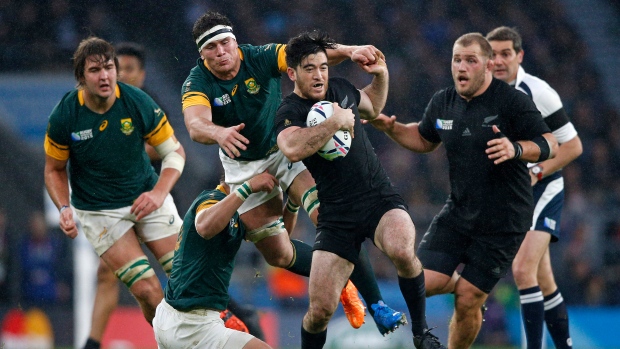Oct 24, 2015
New Zealand beats South Africa to reach Rugby World Cup final
New Zealand advanced its Rugby World Cup title defence to the final by overcoming archrival South Africa 20-18 in the rain on Saturday.
TSN.ca Staff

LONDON -- New Zealand advanced its Rugby World Cup title defence to the final by overcoming archrival South Africa 20-18 in the rain on Saturday.
In an atmosphere thick with tension at Twickenham, the All Blacks clung to their two-point lead for the last 12 minutes and stayed on course to become the first team to win consecutive Rugby World Cups.
The Springboks' own quest to win a third title was washed away, and they had no chance to kick a late dropped goal like they did to beat the All Blacks in the iconic final 20 years ago at Ellis Park.
The All Blacks repelled an attacking lineout by the Springboks, then managed the clock and pinned the South Africans back to not even give them one last peek at the tryline.
"The intensity, the physicality, and what both teams threw at each other was right up there," said New Zealand captain Richie McCaw, who has won 20 of 26 contests against South Africa. "You look back on a game like today, and giving yourself a chance to make a World Cup final, and it's pretty satisfying."
Both teams enjoyed an edge in key areas, but managed to cancel them out.
The All Blacks had a majority of possession and territory, but the Springboks tackled to a standstill.
The All Blacks scored two tries, but their ill-discipline gave the Springboks six kicked penalties.
The All Blacks stole four lineouts, but the Springboks earned a scrum tighthead and scrum penalties.
The All Blacks had a player sin-binned and conceded three points. South Africa had a man sin-binned and conceded only three, too.
New Zealand coach Steve Hansen said the win was even better than the 62-13 hiding the All Blacks gave France in the quarterfinals.
"Great performances don't always look the same, but we enjoy them," Hansen said. "Today was a special occasion."
New Zealand will return to Twickenham next weekend for its record fourth final against either Australia, another two-time champion, or Argentina. Hansen was hoping those teams "smash each other" in the semifinal on Sunday.
The All Blacks trailed 12-7 at halftime, but showed their desire to leave no stone unturned during the halftime break when they came out of their dressing room early and went through running and passing exercises on the field in the rain. Even their reserves did the same.
By the time the Springboks came out, the All Blacks had huddled and refocused. Flanker Jerome Kaino, their first-half try-scorer, was still in the sin-bin, but New Zealand started the second spell where it finished the first, pinning the Springboks deep in their half.
Within six minutes, Dan Carter landed a dropped goal from 35 metres, New Zealand was behind by only two, and Kaino was back.
Another six minutes after that, New Zealand used a knock-on by South Africa's Schalk Burger in his 22, to quickly find where the South African defence was thinnest. It was out left, where Ma'a Nonu drew in two defenders and gave an overlap try to Beauden Barrett, who had just come on as a replacement winger. Carter converted from the left touchline, and New Zealand, at 17-12, led for the first time in half an hour.
The try was a double blow for South Africa. During New Zealand's buildup, Bryan Habana dived over a ruck to bat the ball away from scrumhalf Aaron Smith and, after awarding the try, referee Jerome Garces yellow-carded the star Springboks winger, the only player in the tournament who had played every minute of at least five games.
A scrum penalty gave Boks flyhalf Handre Pollard his fifth success from five shots, but that was immediately cancelled by a penalty kick from Carter, whose 10 points in the match lifted him past Andrew Mehrtens then Grant Fox as New Zealand's leading point-scorer in tournament history.
Pollard was replaced by Pat Lambie, who slotted a 40-meter penalty to cut the gap to two again, and the Springboks forced that attacking lineout in the New Zealand 22. The lineout was uncontested, but New Zealand drove the Boks rapidly backward and turned over possession.
"If you look back to the Scotland-Australia game, a lineout cost the Scottish," McCaw said. "Rather than being scared of it, you back yourselves, after all the practice you've done, to nail those moments. The guys held their composure. The last few minutes at their end of the field made it easier, I tell you."
South Africa coach Heyneke Meyer congratulated New Zealand, and rued the blown chance: "We didn't take it," he said. "We should have been in the final."
